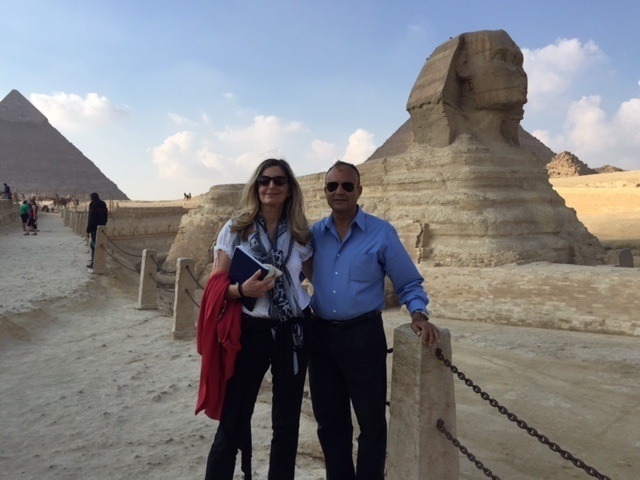5 Reasons To Beat The Pope To Egypt
Pope Francis is heading to Egypt the end of April to visit President Abdel-Fattah el-Sisi and the grand imam of the Al-Azhar mosque.
Here are five reasons every savvy globe-trotter should try to beat him there.
1. Egypt is a bargain right now. Last November, the Central Bank of Egypt devalued the country's currency by 48 percent. So everything's cheap, cheap, cheap. I visited four weeks after the currency adjustment and couldn't believe the prices: gorgeous scarves for $3, an hour-long horse and buggy ride in Luxor for $4, luxury hotels for $50.
2. You get Ramses IV and King Tut to yourself. Thanks to events I need not recount here, tourism to Egypt has been down the last few years. The lines to enter the Great Pyramid of Giza and Luxor's Valley of the Kings are non-existent. My daughter and I enjoyed the guilty pleasure of standing alone in Ramses' tombs, being able to ogle the hieroglyphics and gilded sarcophagus with no pressure to move along for the next ogler. It's truly a magical time to be in a truly magical country. (Yes, some of my news-addicted friends worried for our safety, but I felt completely at ease, never threatened in any way. The news media does all of us a great disservice in its nonstop reporting of anomalous events.)
3. Ancient antiquities are still being found. Less than two weeks ago, a nearly 3000-year-old statue was found buried in the mud of a Cairo slum. The 26-foot (that's nearly three stories tall) yet-to-be-identified statue made international headlines, but according to Khaled al-Anani, Egypt's antiquities minister, only 30 percent of Egypt's glories have yet been unearthed. That means 70 percent of who-knows-what is still buried under the sand. A couple years ago, for example, in Saqqara, two dozen mummies turned up in a 36-foot shaft. The point is that the excavation is just beginning. It's like being in Silicon Valley in the '90s.
4. Locals are warm and welcoming. Perish any notion you might have about Middle Easterners not liking tourists. It's a myth, kind of like the Easter Bunny. Upon our arrival in Cairo, it took a grand total of 15 minutes for me to realize this stereotype is misguided and downright insulting. Hospitality is an art in the Muslim world, a cherished virtue that encourages practitioners to view every person who comes across their path as sent by Allah himself. After spending a couple weeks with Sarwat Hegazy, a longtime guide and co-founder of the tour company Egypt Unveiled, any crusty ideas I might have had about being unwelcome were quickly dashed against the seven-story granite sides of the infamous Sphinx.
Sarwat's partner, Jane Bolinowsky, an Australian flute player who bought a second home within sand-blowing distance of the Giza Pyramid, knows all kinds of fascinating folks. Each of their tours is custom-designed, but visitors should expect to meet belly dancers, costume makers, perfume purveyors, and Egypt's best koshari cooks. Koshari, Egypt's ubiquitous street food, is made with lentils, rice, and macaroni and topped with spicy tomato sauce, garlic vinegar, chick peas, and crispy onions. It's delicious.
5. You get a priceless chance to uplift the world. Pope Francis, of course, is going to Cairo to cement the "spirit of tolerance and dialogue" and to continue the recent thaw in Catholic-Muslim relationships that began when he lovingly embraced the imam during his visit to the Vatican last May. It seems to me that there are few more important things any of us could do than to hug our foreign brothers and realize that we are all the same.
